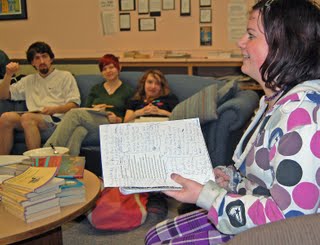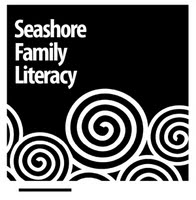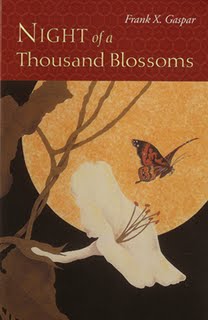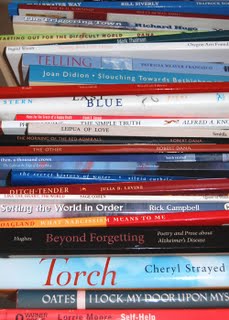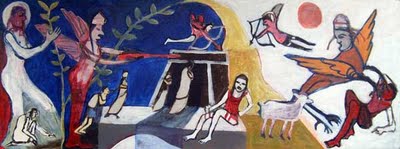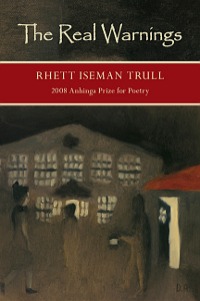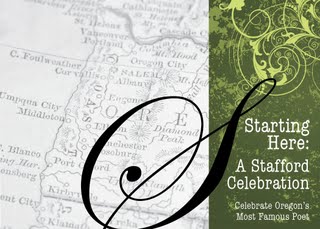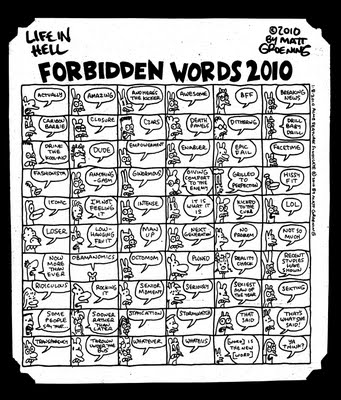The world is full of paper
Stationery
The moon did not become the sun.
It just fell on the desert
in great sheets, reams
of silver handmade by you.
The night is your cottage industry now,
the day is your brisk emporium.
The world is full of paper.
Write to me.
Seashore serendipity
You've heard me chatter about my work with Seashore Family Literacy, the nonprofit organization for which I volunteer, lead writing groups, create marketing materials . . .
Well, if you'll indulge me once more, I'm giddy with a wave of serendipity and want to share it with you. Just this week:
• Senitila McKinley, Seashore's founder/director, was featured in the Portland Oregonian.
Go here to read the story about our very own 'Mother Teresa.' (With thanks to writer Lori Tobias and photographer Faith Cathcart).
• We launched the Seashore website, packed with photos, news and events. (With thanks to my longtime friend and colleague Tracy Weil, of Weilworks, for another great word-art-design collaboration) Go here.
• We joined Facebook. Be our 'friend', 'fan' or just take a gander for grins. Go here.
What is a good poem?
Too many writers? Feeling overwhelmed and small?
Tim Green, editor of Rattle, offers encouragement for those dark days of despair:
"The definition of a great poem is really simple: Poems that have the power to effect the lives of some of the people who read them. Every poem we publish doesn’t have to be memorable and moving for everyone — but it has to be memorable or moving for someone, some kind of person who represents a subset of our readership . . . "
Read more here.
Books devoured & delighted
A bounty of books has left me, once again, scattered and satisifed. Rain, shine, winter, spring, I've always an excuse to curl up and read. This week I've devoured an unusual mix:
• Killshot, by Elmore Leonard
Murder with a side of wry (a shout-out to Fred for suggesting this book)
• A Changed Man, by Francine Prose
A clever novel about a white supremacist turnabout.
I've recently discovered Prose (author of Golden Grove, Blue Angel) and am steadily making my way through all her fiction.
• Night of a Thousand Blossoms by Frank Gaspar
Lush, smart, prose-like poetry.
He's got great titles and beautifully orchestrated searches for truth. I love the opening line of this poem:
There Were Footsteps in the Garden
I can’t figure out the earth, everything saying yes and no
at the same time, everything shedding its hair and licking
its teeth and waiting to be eaten. And then there are the
great wings of the galaxies I’m looking at as they shudder
through the wilderness like spirits until they stoop through
my garden of lenses and mirrors. What is the loneliness
of all those shattered islands, what is so lofty, so hungry,
so intelligent, so needy about them? I’m reading in a holy
book about how the color red shifts and retreats in this
sidereal world, as though the stars are trying to hide
their forms from one another, as though they are afraid
of their nakedness─they all race away, and only the distance
grows, only the distraction, as if that were the point. Now
the yard is so quiet I can hear the snails being pulled
through the long grass by some reckless force beyond their
snail imagination. There are sayings now that would help me.
They would be nothing by daylight. The words try to avoid
embarrassment too. How can you blame them? But in
these pure hungers of the night it is another story. Precisely
another story, and then another and another. Oh, there were
footsteps in the Garden, all right. There was a firmament
hung with lights. But that was then. This is now. That’s what
makes me ask for the next story. That’s what makes me curl
in the blanket on the shivering grass and stare outward. That’s
what makes tonight so safe for this one thing I’m trying to say.
— Frank Gaspar, from Night of a Thousand Blossoms
Out of the book, into the world
From funerals to sports to valentines, it's been a good week for poetry.
Get poetry out of the books and into the world, is my frequent refrain. Poetry for the people, for the masses, for the everyday. This week, I was happy to see it happen:
• The Opening Ceremonies for the 2010 Winter Olympic Games featured slam poet Shane Koyczan, who performed We Are More.
• Also at the Ceremonies, singer k.d. lang performed Hallelujah, a song by acclaimed poet-musician Leonard Cohen.
• I attended two funerals this week, and both included touching amounts of poetry. Though the services were full of sorrow, I was heartened by the healing power of words. Shared at our most tender and touching times — from weddings to wakes — poems awaken and soothe as we struggle to make sense of life's turns.
• For Valentine's Day I received several lovely cards filled with poetry. From Hallmark to handmade, I treasure them all.
Is poetry part of your every day? Tell me about it!
Toss the plans

You will be a starlight when you grow up.
When I'm not a writer-for-hire, I'm a writer-for-fun. I lead writing groups for students ages 9 to 19.
Life takes odd turns. Five years ago when I stumbled into "teaching" (not teaching as much as encouraging), I wasn't crazy about children. Teenagers were daunting. Youngsters were alien, and I had no maternal instinct. Today I am as surprised as anyone to realize I have become attached to these energetic, impressionable, loving children. This is the most fulfilling, and emotionally challenging work, I've ever done.
There are three groups and we meet weekly: Happy Hour (for 9 - 11 years), Writing Club (for 12-13 years) and Writer's Group (for 14-19 years). The programs are part of Seashore Family Literacy (a nonprofit organization) and we meet at the Waldport Community Learning Center.
I am a planner by nature. Organized and structured. I make detailed plans for each week — writing prompts, discussions, books to share, poems to read. But this week I was reminded that the best writing sessions are often the ones in which plans are tossed aside.
The other day, the Happy Hour kids rushed into the Writing Studio in a whirl of giddy excitement. As a reward for good behavior, they had been given fortune cookies. They couldn't wait to share their fortunes with the group.
You will find happiness in unexpected places.
Good luck is just around the bend.
Gathered in a circle, we listened intently and dissected each message: What could it mean? What is happiness? What would luck bring?
We were animated with possibility, and wanted more. So we wrote our own fortunes! Pencils flew across pages. Papers were torn and creased into complicated folds. We traded our palm-sized scribbles with enthusiasm and rushed to share them aloud.
It was 10-year-old K. who saw starlight in my future. I can't wait to grow up.
A meal of books
How to write a good poem
"I think the most important thing any poet or writer can do to improve his or her odds of writing a good poem of any type is to learn continuously how to pay attention.Poetry is not about how we feel, of course. It's about how we feel about how we feel. Knowing how we feel about how we feel requires an almost ungodly attentiveness or consciousness— an otherworldly watchfulness and vigilance."—
Adrian Blevins
from How to Write Love Poems
Tenderness and Rot
Writing Wanted for the Switcheroo
We have a winner!
Congratulations to Laura Rodley, winner of The Real Warnings, a book of poems by Rhett Iseman Trull.
Powerless and poor
"If he'd said it of Jews, he would still be apologizing.If he'd said it of blacks, he'd be on BET, begging absolution.If he'd said it of women, the National Organization for Womenwould have his carcass turning slowly on a spit over an open flame.But he said it of the poor, so he got away with it. . . . read more
Last Chance
Something to celebrate
Writer Revealed: Rhett Iseman Trull
I want to go back to the winter I was born and warn you
that I will flood through your life like acid
and you will burn yourselves on me
— from The Real Warnings Are Always Too Late
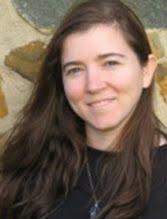
Rhett Iseman Trull's first book of poetry, The Real Warnings was published last fall and won the 2008 Anhinga Prize for Poetry. Her poems have appeared in numerous publications, including American Poetry Review, Best New Poets 2008, and Prairie Schooner. She received her M.F.A. from the University of North Carolina at Greensboro where she was a Randall Jarrell Fellow. She and her husband publish the literary journal Cave Wall in Greensboro, North Carolina.
Q. In choosing your book for the 2008 Anhinga Prize for Poetry, Sheryl St. Germain says “Open this book up anywhere and you'll find a poem of fierce and uncompromising energy and insight . . . I've never read a poet who understands more fully the brutal paradoxes of love and of loving damaged things.” What influences or inspirations led you to poetry, and to these ‘fierce’ poems?

My biggest influence always has been reading. In fact, before I could read, I used to listen to my storybook record of Disney’s The Fox and the Hound over and over. I can quote it still: near the end, there’s this moment that goes, “Sometimes, on warm summer nights, Tod and Vixey would leave the forest and climb the hill overlooking Copper’s house. As Tod looked fondly down at his friend, the voices of a little fox and a little hound seemed to echo in the breeze…”
That sentence did something to me as a child. I could feel the words go straight to my heart and move me in some mysterious and vital way. And I think all of my writing, ever since, has been an attempt to recapture the kind of feeling that ran through me when I first heard those words.
I started by writing short stories and novels. But when I was twelve, I discovered poetry. I was in a summer musical, Annie. I got to be an orphan because I was little and cute, not because I could sing. I wanted to sing, though. I yearned for that world of musicals. More than anything, I wanted to be a Broadway star, but I knew I didn’t have the talent for that path. Singing in musicals lit that same fire the The Fox and the Hound ending did. I think what led me to poetry was that need to sing.
An older girl in the musical that summer showed me her notebook of poems, which she used as a kind of journaling device, pouring her deepest wishes and pains into these poems. I had never thought of poetry that way, as a kind of whole-body song on paper. I was hooked. I went home and started my own poetry notebook.
I like that word Sheryl St. Germain used: “fierce.” I’m honored by that word. Emotions that are fierce are hard to capture in language, and yet that’s why I write poems: that driving need to try to turn whatever I feel with ferocity into some kind of music.
What is your favorite poem in this collection? Why?
That’s a tough one because each poem is special to me for different reasons, and my favorite of the moment changes often. Right now, Heart by Heart the House is my favorite, I think. I wrote it as a challenge and promise to myself to try to live more in the moment. I tend to be a catastrophic thinker, always worried about what awful thing is going to happen next. Most of us live that way, with our minds more in the future or past than the present. I’m learning to love the moment and enjoy the moment more. Heart by Heart the House is a kind of love poem to my husband, Jeff, and to our life, to my life in the moment.
How do you support your poetry habit? Do you have a ‘day job’?
Right now, my “day job” is the non-paying day-and-night job of publishing a poetry journal, Cave Wall. But over the past six years, while trying to complete and polish the poems in The Real Warnings, I’ve had several jobs, from teaching undergraduates at University of North Carolina at Greensboro, to working in my local comic book shop, Acme Comics. I miss teaching and hope to return to it soon.
You are the editor of Cave Wall, a literary journal. How do you balance your work promoting and publishing other writers with your need to do your own writing and promote yourself?
I love working on Cave Wall. I love every aspect of it: discovering poems and art that move me, figuring out the best layout, mailing a finished issue into the world, calling bookstores, opening the mailbox to find a huge stack of submissions. I spend more time on Cave Wall than on anything else in my life. And although it has taken away from my own writing time, I think it’s helped me grow as writer. It’s led me to appreciate more the moments I do have to work on my own writing so that I use that time more wisely.
Before I started Cave Wall, I was putting a lot of pressure on myself, feeling extra critical of every word I wrote. I still get that way sometimes, but Cave Wall has connected me with so many poetry-lovers and poets—not just those we end up publishing but all those who submit their work and all our readers—that gratitude has swept over me and outshined the self-anger and frustration. My writing now comes from a better place inside me. And just realizing how huge and varied the world of poetry is has inspired me. So I think the loss of some writing time is a small price to pay for that feeling of gratitude, inspiration, and awe that Cave Wall has awakened in me.
Balance is difficult both to achieve and to maintain. As soon as one finds it, watch out: something else is just around the corner, coming at you, and you will have to learn to balance all over again. But my advice to all writers out there who are trying to juggle many things (jobs, family, kids, etc.) is to try to catch the frustration as it rises and turn it into gratitude. It’s easier and more fulfilling to write from a place of gratitude.
What poets would you like to emulate? What fiction has your interest?
I have way too many favorite writers to name here, but I will list some. I read a thousand times more than I write, in all styles and all genres. In fact, if I say I’m going to sit down and write this afternoon, that means I’m going to sit down with a stack of books and read and hope something moves me to write. Some of the poets whose work I return to often are Elizabeth Bishop, Mark Doty, Christine Garren, Jack Gilbert (especially The Great Fires), Jeffrey Harrison, Edward Hirsch (especially Wild Gratitude), Richard Hugo, A. Van Jordan, William Matthews, Theodore Roethke, William Butler Yeats, Robert Wrigley (especially Lives of the Animals), Adam Zagajewski.
Lately, I’ve been learning a lot from the poetry of Robert Dana, Sarah Lindsay, Erika Meitner, Jud Mitcham, Liz Robbins, Alison Stine, Natasha Trethewey, Cecilia Woloch…you can’t go wrong with any of those. My favorite novels include Corelli’s Mandolin by Louis de Bernieres, A Prayer for Owen Meany by John Irving, Bel Canto by Ann Patchett, Housekeeping by Marilyn Robinson, East of Eden by John Steinbeck, Mrs. Dalloway by Virginia Woolf.
I love short stories, as well, and have been spending a lot of time lately with beautiful stories by Holly Goddard Jones and Kevin Wilson. Also, one of the best short stories I’ve read recently was published earlier this year in the journal One Story. It’s called Hurt People by Cote Smith. I think it was his first published story, and I can’t wait for more by him.
I read many comic books, as well. My favorite recent titles are Alias by Brian Michael Bendis, Cassanova by Matt Fraction, Y the Last Man by Brian K. Vaughn, and Fables by Bill Willingham.
I’m a collector of words and often have my students collect words, too. Do you have any favorite words?
The words that come to mind are the names of my cats: Charm, Chulita, and Pita; and Chulita’s nickname, Boombadoom. That’s weird. Maybe it’s because I say those words more often than other words throughout the day and associate them with happiness. Theodore Roethke wrote that poetry is giving a cat its right name, or something like that. So yeah, I’m gonna go with: Chulita, Pita, Charm.
You’ve done many interviews and readings since your book was published. What question hasn’t been asked that you’d like to answer?
I haven’t been asked about the importance of revision. For me, the majority of the writing process, and the place where the magic happens, is revision. It’s not unusual for me to work on a poem for years before it’s ready for an audience.
There’s a sequence of poems in my book called Rescuing Princess Zelda. It’s made up of nine poems that take place in the adolescent wing of a state mental institution. From start to finish, I worked on that series for ten years. When I wrote the first poems for it, I didn’t know it was a series, so I guess I should clarify that I worked on the poems in it for ten years and worked on it as a series for about six years. I’m not quick to let go of a poem. I like to slow down, let a poem sit in a drawer for awhile, and return to it many times over many months to see what emerges.
Every now and then a poem will spill out almost whole, almost polished, in a first draft. This happens for me with maybe one out of every 25 poems I write. And that’s a great feeling, a boost in confidence and energy.
But I think, maybe, the more rewarding feeling for me is when a poem I’ve worked on for months, even years, comes together and all that time spent pouring over dictionaries and research, all that time switching around the syntax, pays off. The majority of my poems need that kind of time to find their right shape and language. I am a big believer in the transformative gifs that come from time and distance.
WIN a copy of The Real Warnings
It's easy. To enter, simply write a comment below, or send an email to dcm@drewmyron.com. Provide your name and contact information. A winner will be selected at random from the entries. But hurry! All entries must be received by January 30, 2010.
Crack
Ring the bells that still can ring
Forget your perfect offering
There is a crack, a crack in everything
That's how the light gets in.
— Leonard Cohen, from Anthem
And the winner is . . .
In the drawing for a consultation with book marketing coach Liz Nakazawa, the lucky winner is Jennifer Jeanelle. Congratulations!
Have a suggestion for our next Fast Chat Friday? These informal, end-of-week interviews feature writers, publishers, editors and other creatives. Feel free to send me your suggestions.
Forbidden Words
Show up
Hope begins in the dark, the stubborn hope that if you just show up and try to do the right thing, the dawn will come.— Anne Lamott


